Karbala, Iraq – Every year, millions of Shia Muslims and some people of other faiths from around the world take part in a special pilgrimage ritual, culminating in what is arguably the world’s largest public gathering.
Usually on foot, for about 20 days, the pilgrims trek hundreds of kilometres from cities around Iraq and Iran to the holy city of Karbala where they commemorate the death in battle of Imam Hussein.
Hussein, the grandson of the Prophet Muhammad and son of Imam Ali, was killed in 680 AD on the plains of Karbala in a battle against the forces of the Caliph Yazid, whose ascendancy to the caliphate was contested.
To mark the 40th day of mourning for Hussein – the traditional mourning period – the pilgrims arrive in Karbala to pay tribute at his shrine, which is surrounded by millions on the final day of Arbaeen.
Along the route, volunteers set up stations to provide the pilgrims with food, water and shelter while people from the villages along the way keep their doors open to anyone who needs a place to stop.
Many pilgrims opt to walk 80km (50 miles) from the nearby city of Najaf, where Imam Ali, Hussein’s father, is buried, to Karbala.
Those who make the trip from distant cities, like Mashhad in Iran – 2,600km (1,600 miles) away – opt to drive.

Ali Hussain, 15, from the Najaf city, offers free cold water cups to pilgrims walking on the highway from Najaf to Karbala. Ali is stationed with people from his locality, serving people on the highway towards Karbala for the past eight days and providing cold water cups. He says, ‘This year, the Arbaeen pilgrimage has come in hot weather. We use large ice bricks to make water cups cold and serve about 5,000 cups daily.’ This year, during the walk, the mercury hit 50 degrees Celsius

Pilgrims holding flags walk towards Karbala. The walk from Najaf to Karbala passes through 1,452 poles – each 50 metres (164 feet) apart. It takes pilgrims two to three days with rest breaks to reach Karbala.
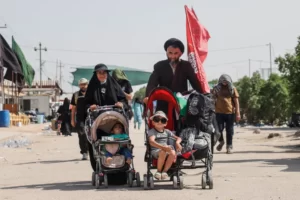
Syed Rahim, a Shia scholar from Qom, Iran, walks towards Karbala with his family, including two infants. On his eighth visit to Karbala, he says bringing infants along in this hot weather was ‘an expression of love towards Imam Hussein and his cause’

Muntazir, 14, serves Iraqi tea at a temporary makeshift camp on the way towards Karbala. The camp, made using date palm leaves, gives a traditional feeling to the visitors passing by. ‘I have grown up serving pilgrims during Arbaeen and have learned this from my parents,’ Muntazir says.
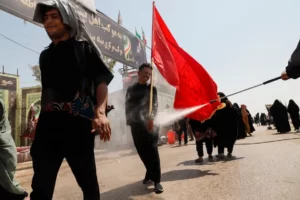
Ali, from the Iranian city of Mashad, is associated with pilgrim service Abshar Atifiha. He uses sprinklers to spray water on the people during the daytime. ‘As the temperatures rise in the day during the walk, we spray water on people. That brings them relief in walking in the heat,’ he says.
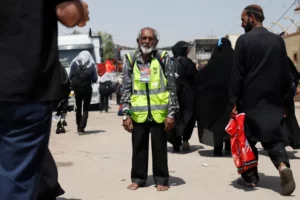
Mirza Pyare Jani Aga, 73, an Indian pilgrim from Mumbai, walks barefoot towards Karbala. He says, ‘I came to Karbala in 1974 for the first time. And for the past 10 years, I have been walking barefoot.’ Aga arrives 10 days before the Arbaeen day and serves pilgrims in an Indian pilgrim service called ‘Karwan-e-Hind’, which provides free food and accommodation to pilgrims on the way to Karbala.
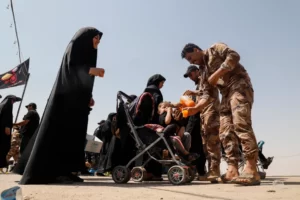
Popular Mobilisation Forces personnel serve refreshments to children on their way to Karbala. Hyder, one of them, says, ‘Apart from defending our county, I have got an opportunity to serve the pilgrims of Imam Hussein, and this brings me peace.’ Popular Mobilisation Forces is an umbrella group of militia set up to fight the ISIL (ISIS) group in the region since 2016.
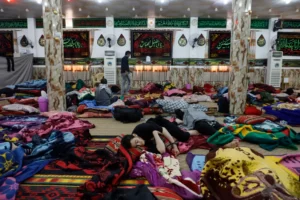
People rest inside a shelter, called ‘moukib’, on the way to Karbala. Moukib is a permanent shelter providing facilities to pilgrims, including food and accommodation, which are set up on the way to Karbala by locals and people from other countries who serve pilgrims.

Ali, a tailor from Iran, repairs bags along with his wife as a free service to pilgrims. In the past five days, he received 100 bags daily. He says, ‘This is my way of serving people, and I feel proud that I can contribute anything in the way of Hussein.’
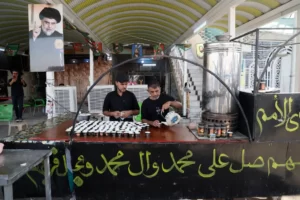
Sadiq, 49, an employee in an oil company, and his group serve Iraqi tea in the early morning to pilgrims. Despite rising temperatures, people prefer to have Iraqi tea during the pilgrimage. The group serves more than 2,000 cups daily at their moukib, he says.

People charge mobile phones at an Iranian moukib.
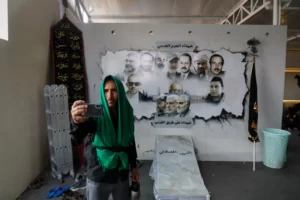
A person takes a selfie next to the portraits of influential figures from the Muslim world at the Palestine gallery on the way to Karbala during the Arbaeen walk. Jawad, a young pilgrim from Lebanon, says, ‘There is a need to know contemporary issues of our Muslim world, and that is what the tragedy of Karbala teaches us – to rise against the falsehood and support the truth.’
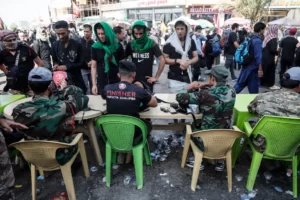
Volunteer fighters from Al-Abbas Combat Division check pilgrims’ bags as they enter a check post at Karbala during the Arbaeen walk. The division is part of the Popular Mobilisation Forces that fought ISIL on the front lines.

An Iraqi youth burns esfand seeds to create incense during night-time as pilgrims walk towards Karbala.
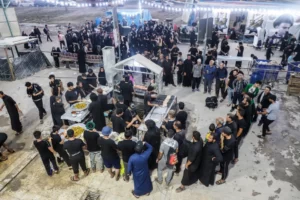
Volunteers at a moukib on the way to Karbala prepare evening food for pilgrims. Sheikh Abbas Ali, who heads a moukib, says, ‘We serve 15,000 meals a day … 2,500 litres of milk is used daily’.
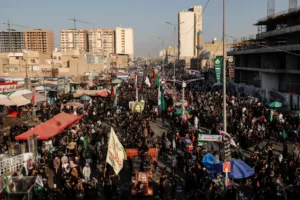
A street leading to the holy shrine of Karbala witnessed a huge rush of people on the day of Arbaeen as pilgrims paid their visits to the holy shrine of Imam Hussein
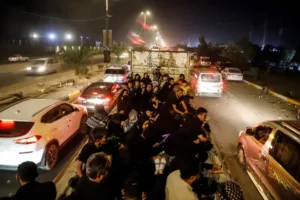
A group of pilgrims travels on an open trolley towards Karbala on the eve of Arbaeen. Millions of people made their way to Karbala by foot and many travelled by cars.
Short link
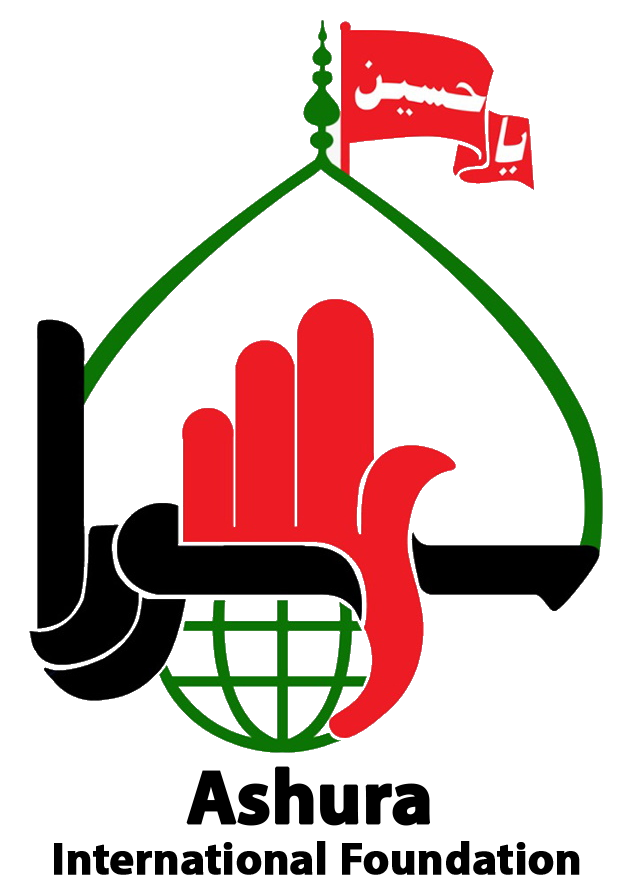
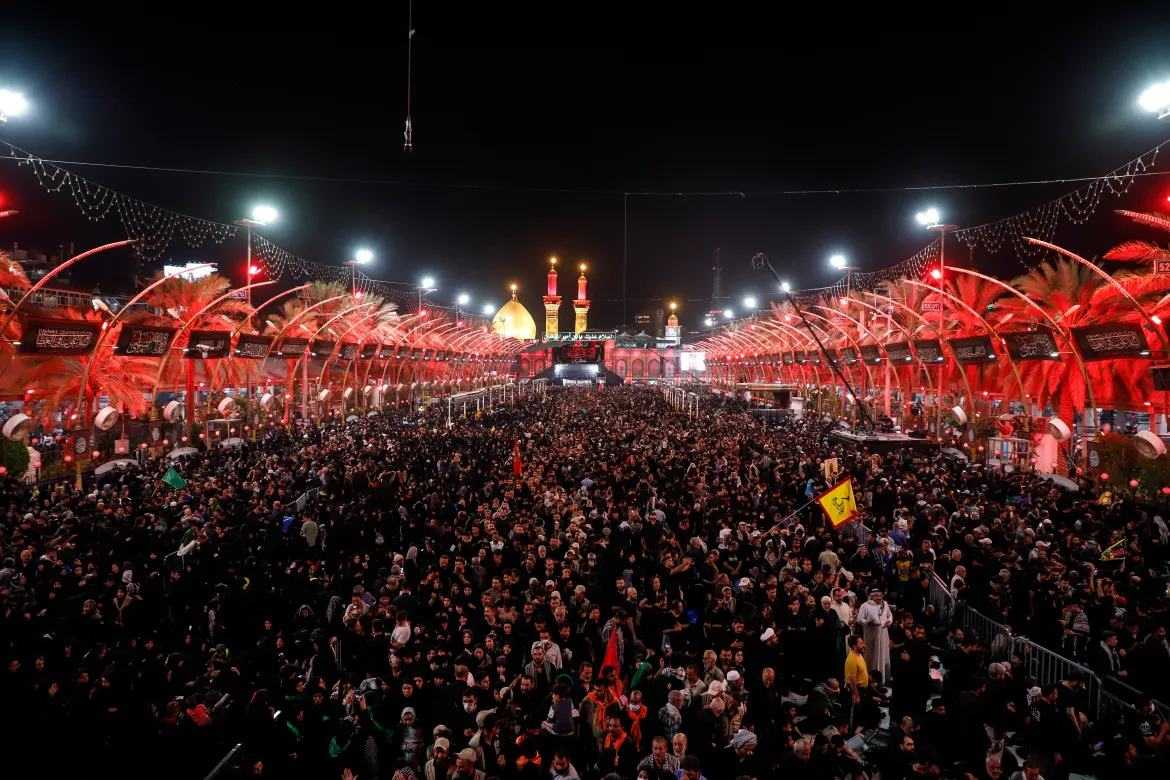
Questions and Comments